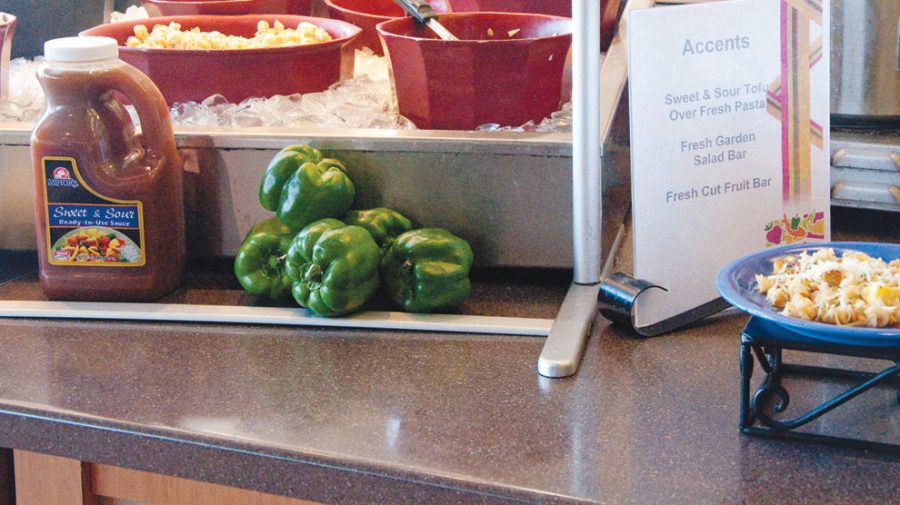Though the reasons for choosing a vegetarian or vegan lifestyle vary, personal health, ethics or a simple love for animals are among the most common, said Sheena Quizon, a dietitian at the Student Health Center.
There has been an increase in the number of students seeking guidance with a vegetarian diet, she said.
“With an even greater emphasis now on the prevention of chronic diseases through diet and other lifestyle changes, vegetarian diets have become more popular over the years,” Quizon said.
Vegetarianism includes different degrees of diets. A lacto-vegetarian diet consists of plant foods plus some or all dairy products. A lacto-ovo vegetarian diet consists of plant foods, dairy products, and eggs. A partial vegetarian diet consists of plant foods and may include chicken, fish, dairy products, and eggs, but excludes red meat. A vegan diet consists of only food of plant origin.
According to the American Dietetic Association, following a proper vegetarian meal plan has led to decreased rates in diabetes, obesity, cancer, hypertension and cardiovascular disease.
Quizon added that though there are health benefits by excluding these elements from a diet, vegetarians and vegans need to make sure they are thinking of alternative ways to get their necessary nutrients.
“I think the biggest challenge for most students who are wanting to start a vegetarian lifestyle is that they need to make sure they are thinking of alternative ways to get the vitamins and minerals they would be missing from meat products,” Quizon said.
Most vegetarians are able to get their adequate supply of protein through foods such as eggs, rice, nuts, beans and tofu. For those giving up dairy products, foods such as soy milk, spinach and collard greens offer adequate amounts of calcium.
Amy Swartz is the vice president of the UA Vegetarians, Vegans, and Allied Community, which has over 100 friends on Facebook. She said that the Ferguson Center has options for vegetarians and vegans, but she suggests trying the options in restaurants around town, such as the customizable pitas at the Pita Pit, tofu at Lai Lai and a veggie sandwich at the Crimson Café.
“I think the best place to get something vegetarian or vegan around the campus area is Hooligan’s,” Swartz said. “Hummus is a vegan’s best friend.”
Meridith Shook, a junior majoring in Spanish and art history, has been an ovo-lacto vegetarian for five years and has been less than impressed with the on-campus options of vegetarian meals. She now brings her own lunch and snacks to campus.
“When I used to eat at the dining halls, I was primarily limited to salads and the occasional ‘stir-fry,’” Shook said. “One time, when I requested a veggie burger at Lakeside, an employee tried to just hand me a bun with tomatoes and lettuce.”
Quizon said the main thing to remember when adopting a vegetarian or vegan lifestyle is to eat a wide variety of foods, including fruits, vegetables, plenty of leafy greens, whole grain products, nuts, seeds and legumes. For anyone considering vegetarianism, Quizon suggested meeting with a dietitian to ensure that the vegetarian is meeting all the necessary amounts of vitamins and minerals they need and to see if a vitamin/mineral supplement is warranted.
Ethicist Stuart Rachels wrote an essay entitled “Vegetarianism” in which he argues that we should not only boycott industrially produced meat, but should not even kill animals humanely for food. His essay lists animal cruelty, infectious disease, pollution, harming the powerless and health as reasons why should all be vegetarians.
“The philosophical arguments for vegetarianism are easy,” Rachels wrote in his essay. “The difficult thing is getting people to stop eating meat.”
Martin Thornton, a senior majoring in social work, has been a vegetarian for more than two years and names vegetarian brands that he likes as inspirations for his diet. His primary tip for anyone considering a vegetarian lifestyle? Study.
“Study before you become a vegetarian because you need to know what to eat and where to get all your nutrients to be healthy,” Thornton said. “Eating meat is unnecessary because I can get my nutrients from other sources, and therefore, I don’t have to eat animals.”
Shook did her research and realized that vegetarianism had the potential to be better for both her body and the environment. She encourages anyone to try being a vegetarian or vegan for a week.
“It can’t hurt you, and you’ll only learn more about yourself and other people by experimenting.”
If a student is interested in meeting with a registered dietitian on campus, they can contact the Student Health Center at 348-2778 to set up an appointment. The appointment is $20 and billed straight to the student account.









